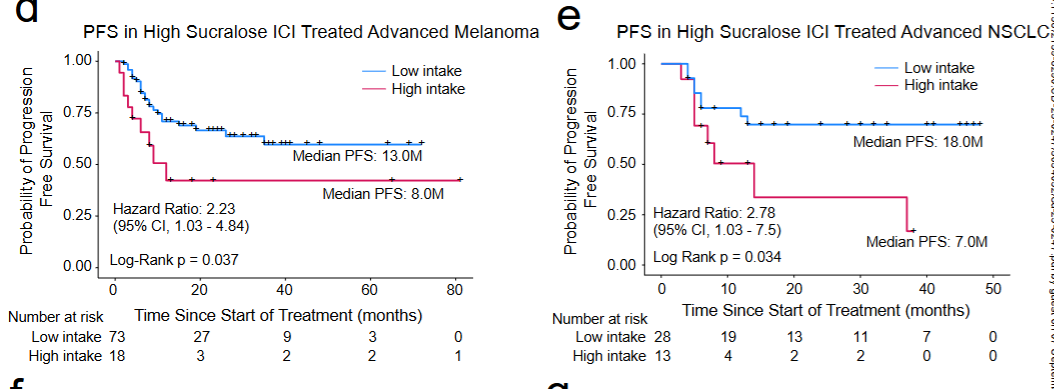
Comment:
Interesting mechanism regarding the depletion of arginine, and restoration of function with arginine or citrulline supplementation. Does that indicate that supplementing with those would benefit people on immunotherapy regardless – there is data to support that it does, see here.
Summary:
Sucralose Consumption Ablates Cancer Immunotherapy Response Through Microbiome Disruption
Clinical Bottom Line
This observational study of patients with advanced melanoma and non-small cell lung cancer reports a strong association between higher dietary sucralose intake and poorer outcomes with immune checkpoint inhibitor therapy, including lower response rates and shorter progression-free survival. Because this is an observational study that relies on patient-reported dietary habits, it cannot prove that sucralose causes immunotherapy resistance. However, the study presents compelling preclinical data from mouse models suggesting a plausible biological mechanism, where sucralose alters the gut microbiome, leading to impaired T-cell function. This finding warrants further investigation in prospective trials but suggests it is reasonable to counsel patients about a potential negative interaction between high sucralose consumption and immunotherapy efficacy.
Results in Context
Main Results in Human Cohorts
The study analyzed three separate cohorts of patients receiving anti-PD-1 based immunotherapy: 91 with advanced melanoma, 41 with advanced non-small cell lung cancer (NSCLC), and 25 with high-risk resectable melanoma. Dietary intake was assessed prior to treatment using a food frequency questionnaire.
-
Association with Objective Response Rate (ORR): In a multivariate analysis, high sucralose intake (>) was independently associated with a lower probability of achieving an objective response in advanced melanoma patients. An odds ratio of 0.28 suggests that patients with high sucralose intake had a 72% lower odds of responding to immunotherapy compared to those with low intake. A significantly lower ORR was also seen in the NSCLC cohort.
-
Association with Progression-Free Survival (PFS): High sucralose intake was significantly associated with worse PFS in both advanced melanoma (median PFS 8.0 months vs. 13.0 months) and advanced NSCLC (median PFS 7.0 months vs. 18.0 months). In a multivariate model for melanoma, high sucralose intake was associated with a nearly threefold increase in the hazard of progression or death (Hazard Ratio 2.91). A hazard ratio is a measure of how often a particular event happens in one group compared to another over time; a hazard ratio of 2.91 means there is a 191% increase in the hazard of progression or death in the high-sucralose group.
Mechanistic Findings in Preclinical Models
To investigate the biological mechanism, the researchers used mouse models of melanoma and adenocarcinoma.
-
Microbiome and T-Cell Function: In mice, sucralose consumption altered the gut microbiome, leading to an increase in bacteria that degrade the amino acid arginine. This resulted in lower levels of arginine in the serum and within the tumor itself.
-
Impact on Immunotherapy Response: The reduction in arginine was shown to impair the function of antitumor T-cells, leading to T-cell exhaustion and resistance to anti-PD-1 immunotherapy.
-
Restoration of Response: The negative effects of sucralose on immunotherapy response in mice were reversed by either performing a fecal microbial transplant from responder mice or by supplementing the diet with arginine or its precursor, citrulline.
Assertive Critical Appraisal
Limitations & Bias (STROBE Framework)
-
Confounding: While the investigators performed a multivariate analysis to adjust for several known prognostic factors, observational dietary studies are highly susceptible to unmeasured confounding variables. Dietary habits are complex; sucralose intake may be a surrogate for other dietary patterns (e.g., consumption of processed foods) or lifestyle factors (e.g., socioeconomic status) that could independently influence immunotherapy outcomes. The study’s conclusions about sucralose are therefore an association, not a proven cause.
-
Information Bias: The study relied on a Food Frequency Questionnaire (FFQ) to quantify sucralose intake, which is dependent on patient memory and recall. This method is prone to recall bias and may not accurately capture true dietary patterns, potentially leading to misclassification of patients into high- and low-intake groups.
-
Generalizability: The preclinical findings, while mechanistically compelling, were observed in mouse models. While these results provide a strong biological rationale for the findings in humans, they cannot be directly extrapolated. The association observed in the human cohorts requires confirmation in a prospective, randomized trial before a causal link between sucralose and immunotherapy resistance in humans can be established.
Research Objective
The stated objective was to determine the impact of sucralose consumption on the efficacy of immune checkpoint inhibitor (ICI) therapy in preclinical cancer models and in cancer patients, and to investigate the underlying mechanisms related to the gut microbiome.
Study Design
The human component of the study was an observational analysis of three prospectively collected patient cohorts. Patients were categorized based on self-reported dietary sucralose intake and followed for clinical outcomes. The preclinical component involved controlled experiments in mouse tumor models.
Setting and Participants
The human study included 157 adult patients from the UPMC Hillman Cancer Center with advanced melanoma, advanced NSCLC, or high-risk resectable melanoma, who were scheduled to be treated with systemic anti-PD-1 based immunotherapy. Patients were required to have completed a dietary questionnaire prior to starting therapy.
Bibliographic Data
-
Title: Sucralose consumption ablates cancer immunotherapy response through microbiome disruption.
-
Authors: Kristin M. Morder, Madison Nguyen, Drew N. Wilfahrt, et al.
-
Journal: Cancer Discovery
-
Year: 2025
-
DOI: 10.1158/2159-8290.CD-25-0247
This AI-generated analysis is for informational and research purposes only and is not a substitute for professional medical advice, diagnosis, or treatment. Always seek the advice of a qualified health provider with any questions you may have regarding a medical condition.“}
Original Article:
Full text pdf: Sucralose consumption ablates cancer immunotherapy response
Rights and permissions
Open Access This article is licensed under a Creative Commons Attribution 4.0 International License. No changes were made.
To view a copy of this licence, visit http://creativecommons.org/licenses/by/4.0/.
